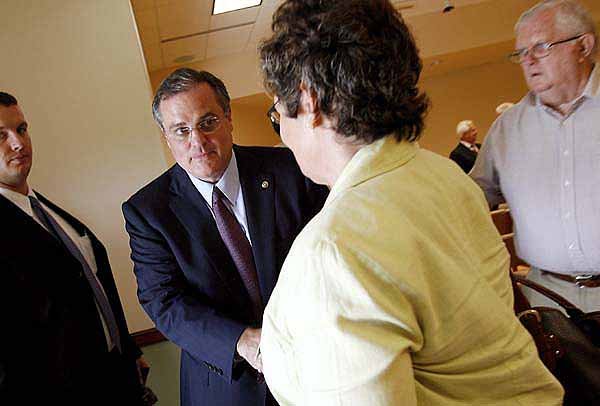FAYETTEVILLE — Nobody in Washington is talking about a government takeover of health care, U.S. Sen. Mark Pryor, DArk., told a crowd of about 50 health-care workers Tuesday at the Pat Walker Center for Seniors.
Pryor said the hysteria over a plan to overhaul health care is premature. Lawmakers are only about halfway through the process, he said, and the content of the final bill has yet to be determined.
Democratic congressmen have been shouted down at town hall meetings across the country as they try to explain the details of HR 3200, the Affordable Health Choices Act of 2009, a 1,018-page document that is largely the product of Democrats in the House. U.S. Sen. Blanche Lincoln, D-Ark.,has said the organized protests have kept others at the meetings from being able to learn about the proposed legislation.
Only three protesters showed up before Pryor toured Washington Regional Medical Center on Tuesday. They held signs on a nearby street corner. The seniors center is part of the Fayetteville hospital.
In the House of Representatives, three committees - Ways and Means, Education and Labor, and Energy and Commerce - have passed versions of HR 3200. All three committees plan to patch up the differences during the August recess. When representatives return in September, they'll begin considering the bill that results from the committees' efforts.
The Senate's Health, Education, Labor and Pensions Committee completed its version of the health bill July 15. The chamber's Finance Committee still has one in the works, and that one will take precedence because that committee must figure out how to pay for the plan, Pryor said.
The two Senate bills will be merged into one, and senators will vote on that proposal. Representatives will vote on the final House bill. Those two bills must be blended into a single, compromise version. Then each chamber must vote again on the final bill. If it passes, the bill then goes to President Barack Obama, who can sign or veto it.
Pryor said the Senate Finance Committee is trying to draft a nonpartisan bill and get three Republicans to support it.
"I ask you to please be patient with us," Pryor said to the group, which consisted primarily of hospital employees. "The process is working, and it's working fairly well."
"I see what's happening is socialism," said Suzanne Santiago, a registered nurse with hospice care at the hospital, during a 30-minute question-and-answer session after Pryor's brief address. "I see it as an end to freedomfor us."
"Medicare, Medicaid, the V.A.: The government has been involved in health care for a long time," Pryor said, in response.
He said one of the reasons the United States has Medicare and Medicaid is that private insurance companies didn't want to insure the elderly or poor.
Pryor said the U.S. spends twice as much on health care as other industrialized nations, "and we don't always get the best results."
Citing figures from the Centers for Medicare and Medicaid Services, Pryor said the amount of money spent on health care annually equals about $8,000 for each American. If nothing changes, by 2018, the figure will be $13,000 per person, for a total of $4.3 trillion. That would amount to about 20 percent of the gross domestic product.
"I hear people say, 'No, no, no - don't do anything,'" Pryor said. "But that has a huge cost with it."
Pryor said 50 percent of the money spent on health care in the U.S. goes to insurance companies, middle men and to offset the cost of providing health care to the uninsured. Pryor said he supports insurance reform but not a government-run system, often referred to as a single payer system.
The Senate bill will prevent insurance companies from barring coverage if a person has a pre-existing condition, he said.
Pryor said a "public option" is being considered, but that has yet to be worked out. The phrase refers to what is essentially a government-run insurance plan that would compete with private insurance plans.
Pryor said a part of the House bill that has become controversial doesn't refer to euthanasia. It merely says the system would pay for a consultation with a physician once every five years as patients near the end of their lives.
The complete text of the House bill can be accessed by going to the Library of Congress Web site at thomas.loc.gov and clicking on a highlighted link on the home page.
The Senate's Health, Education, Labor and Pensions Committee bill can be found by going to its Web site at help. senate.gov.
Northwest Arkansas, Pages 11, 12 on 08/12/2009

